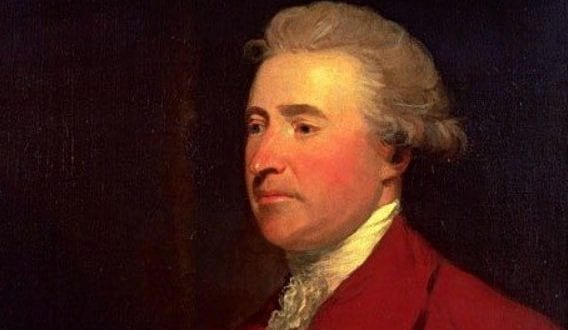Herland Report: Hanne Nabintu Herland: Edmund Burke and Modern Conservatism: Conservatives believe that law and order is necessary since man has an inherent tendency to exploit others to his own benefit.
Man needs to control his selfish desires whether he is rich or poor. Hence the need for ethics and a normative approach in order to avoid chaos and anarchy.
The 1700s English philosopher and founder of modern conservatism, Edmund Burke, was a strong voice for these ideals, writes Hanne Nabintu Herland in the regular column at World Net Daily, one of America’s leading Conservative outlets.
Reforming society is, as we know, not always for the better. And today, as chaos and civil unrest seems to sweep across the United States’ political theatre, a study of Burke may serve as a reminder of the values that may help the U.S. return to stability.

Edmund Burke and Modern Conservatism: Burke deeply disagreed with the ideology of the French Revolution – which enhanced bloody overthrow of governments, civil wars, guillotines and beheadings in the streets.
This would not lead to prosperity and stability, he argued. And he was right.
The French anarchy led to immense atrocities against the people, Robespierre administered guillotines on almost every corner in Paris and citizens who disagreed the slightest were killed. It was not until Napoleon took control over France that law and order was reinstated in the nation.
RELATED ARTICLES:
- The New Left’ desire to silence the Majority – Nabintu, WND.
- Universities as Globalist New Left propaganda tools – WND
- Faith is Scientifically Proven Great effect on Health. WND, Hanne Herland.
- Anti-White America is the New Normal. Hanne Nabintu Herland, WND.
- 1960s: How the neo-Marxist New Left destabilized the West, Hanne Herland.
- Suicide and Atheist Emptiness: No inner Peace #CarolineFlack #AriBehn.
The aim became to remove European traditional values and replace them with a new set of ethics: Atheism and the Socialist mindset.
We live in the aftermath of this experiment today, as the Socialist way of thinking has broken down traditional ethics, order and the strength of the European culture.
Within the framework of law and order, Edmund Burke therefore sought to reform the British society gradually rather than rapidly, and aimed at halting the elites’ abuse of power without heading toward civil war.
According to “The Cambridge Companion to Edmund Burke,” Burke firmly believed that religion is one of the main foundational pillars of society.
He criticized deism and atheism and maintained that Christianity was vital to maintain in order to push for social progress, both for man’s soul on the personal level, as well as for political arrangements and the preservation of constitutional and civil liberties.
The idea of limited governmental authority was viewed as essential, the necessity of independent institutions, the need for the secular separation of church and state to ensure a free, democratic society.
Burke strongly believed in the liberty of the people and the need to protect them against the political elites’ abuse of power.
He felt that only with a full understanding of history, could one avoid repeating mistakes of the past.
Yale University professor David Bromwich points out in “The Intellectual Life of Edmund Burke” that Burke wished for a society built on trust, and felt that democracy in its modern form could easily mean the end of the loyalty between the generations and the breaking away of social bonds between family structures and cultural roots.
He analyzed the French Revolution (1789) – its ideology later developed into Marxism, socialism and communism.
It also anticipated the Russian Revolution of 1917, as well as the elite’s atrocities against civilians in the Soviet Union, for example, under Lenin and Stalin.

«This is a remarkable book by a remarkable person. Excellent work.” Dr. Paul Craig Roberts, leading American political economist
Edmund Burke and Modern Conservatism: A strict socialism effectively means the end of personal freedom and totalitarian state rule. Many forget that the Nazi movement in Germany was a socialist movement. NAZI is the abbreviation of National Socialist Labour Party in Germany.
It saw Adolf Hitler come to power in a Western democratic nation, heavily controlled by mainstream media propaganda. The people were silenced by the strict ideology of socialist consensus, with diversity forbidden and freedom defined as the right to agree with the National Socialist elites.
Burke’s almost prophetic analysis of the future of democracies makes him a refreshingly different voice to this day.
RELATED READING:
- The scientific cure for Depression: Prayer – WND
- Faith is Scientifically Proven Great effect on Health. WND, Hanne Herland.
- The Liberal Tyranny of Feelings, Psychology and Victimhood.
- The Correlation between social disorder and Christian Decline. WND.
- US Senator Richard Black: Herland Report global reach, speaks truth, genuine substance.
Edmund Burke and Modern Conservatism: Bromwich points out that Burke was heavily engaged in criticizing the British Empire and especially the East India Company, which he felt misused its economic power and subdued Indians in a way that never would have been accepted if it were done to Englishmen.
He was one of the very first in modern Europe to discuss international justice at length and the need for Britain to keep its responsibilities toward the citizens of India, which it had colonized.

Edmund Burke and Modern Conservatism: So, the rise of totalitarianism in democratic states has worried Europe’s intellectuals for a long time. Conservatism and its respect for plurality, freedom of religion, traditions and reluctancy to reform society too quickly may be the right path forward to regain stability.










